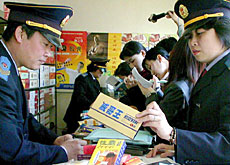Roche and Novartis fall victim to Asian counterfeiters

The Swiss pharmaceuticals groups, Roche and Novartis, are demanding action to tackle the large number of counterfeit drugs flooding the Asian market.
Copies of patented drugs look like the real thing, but often contain deadly substances.
Imitation drugs are circulating throughout Asia and are thought to be responsible for the deaths last year of 192,000 people in China alone.
Now Roche and Novartis have joined other major pharmaceutical firms in calling on the Chinese authorities to clamp down on the counterfeiters.
Counterfeit drugs
The federation of drug manufacturing associations in Geneva estimates that one to two per cent of drugs sold around the world are fakes.
But, according to Novartis, that figure rises to 25 per cent in developing countries. And in some cities in China up to 40 per cent of drugs are thought to be counterfeit.
Novartis says the counterfeit drugs – usually containing talcum or rice powder – are normally produced by cells of three or four people, making it hard for the authorities to track them down.
But there have been notable successes. The China Daily reported that last year the Chinese authorities closed down 1,300 factories and seized SFr85 million ($57 million) worth of counterfeit medicines.
More recently police in the Philippines arrested five businessmen who were trying to pass off copies of drugs made by Novartis, Pfizer, GlaxoSmithKline and other pharmaceutical companies.
Safety measures
In an effort to combat the counterfeit trade, Roche has begun inscribing its name on the bottom of glass jars containing the antibiotic Rocephin.
But the measure has not proved entirely successful. Although the drug is only sold through the hospital network, Leo Lee, a Roche executive in Shanghai, says there is more Rocephin on the Chinese market than his factory produces.
Lee’s claims counterfeiters are going through hospital rubbish bins and removing jars bearing the Roche inscription in order to fill them with copies.
swissinfo, Georges Baumgartner
Counterfeits thought to account for 1-2 per cent of drugs sold worldwide.
40 per cent of drugs in China believed to be fakes.
Up to 192,000 people in China killed by fake drugs last year.

In compliance with the JTI standards
More: SWI swissinfo.ch certified by the Journalism Trust Initiative
You can find an overview of ongoing debates with our journalists here. Please join us!
If you want to start a conversation about a topic raised in this article or want to report factual errors, email us at english@swissinfo.ch.